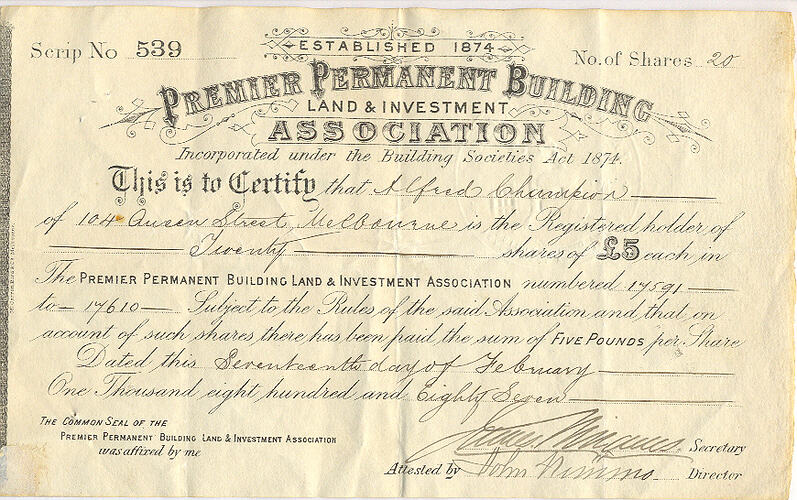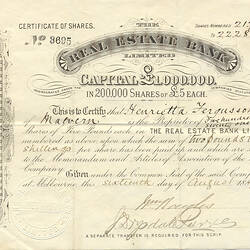Summary
Premier Permanent Building Land & Investment Association Scrip issued to Alfred Champion of Melbourne, Victoria, Australia
[Registered Office not listed]
17 February 1887
20 Shares
Capital: [Capital not listed] Shares at 5 Pounds each
Certificate No. 539
Obverse Description
Printed on white stock, black printed lettering and black, handwritten text. Border at left side of page.
Significance
The scrip is significant as an example of the extensive land speculation that occurred in Melbourne in the 1880s.
The Premier Permanent Building Association was one of the largest building societies during Melbourne's land boom of the 1880s, and one of the first to collapse, in March 1890. The building society was founded by James Mirams, newsagent owner in Collingwood, and its elected member of parliament from 1876-86; Mirams was a deacon of the Congregational Church and early member of the YMCA. He was a close friend and business associate of James Munro, member for Carlton, and subsequently Premier, 1890-92, whose speculative businesses also collapsed. The Premier Permanent built a lavish 5-storey office at 229 Collins Street, and attracted new deposits of 660,000 pounds in 1888 alone. The money, boosted by large bank loans, was used to invest in a huge range of projects, including city land purchases, the construction of the Federal Coffee Palace, and suburban land developments.
In March 1890 Mirams filed for a secret liquidation of the building society, with debts of more than 370,000 pounds. Mirams estate finally paid 2d. in the pound on his debts. It transpired that the Premier Permanent had been using the mortgages from loans to its customers as security to borrow further money. The society's liquidator's investigations resulted in the conviction of the company secretary for embezzlement. A number of charges were brought against the company directors, and Mirams was sentenced to 12 months imprisonment for issuing a false balance sheet; a finding he would vehemently deny. [R. Gillespie, 12 Jan 2006; based on Michael Cannon, The Land Boomers, 1972, ch 18]
More Information
-
Collection Names
-
Collecting Areas
Home & Community, Public Life & Institutions, Numismatics & Philately
-
Acquisition Information
Cultural Gifts Donation from Harry M. Hearn, Date Range 1989 - 1991
-
Acknowledgement
Donated through the Australian Government's Cultural Gifts Program.
-
Date Issued
1887 AD
-
Issued By
Premier Permanent Building Land & Investment Association, Collins Street, Melbourne, Greater Melbourne, Victoria, Australia, 17 Feb 1887
-
Issued To
Alfred Champion, Melbourne, Greater Melbourne, Victoria, Australia, 17 Feb 1887
-
Other Association (See Comments)
James Mirams, Collins Street, Melbourne, Greater Melbourne, Victoria, Australia, 17 Feb 1887
Signatory & Secretary of company -
Material
Paper
-
Classification
-
Category
-
Discipline
-
Type of item
-
Overall Dimensions
22.2 cm (Length), 13.8 cm (Height)
-
Dimensions
222 mm (Length), 137 mm (Width)
Measurement From Conservation.
-
Shape
Rectangle
-
Keywords
Banking Industry, Finance Industries, Real Estate, Share Certificates

